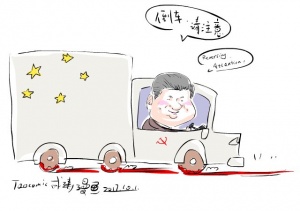“To drive backwards”的版本间的差异
来自China Digital Space
| 第1行: | 第1行: | ||
<h3>''dǎochē'' 倒车</h3> | <h3>''dǎochē'' 倒车</h3> | ||
[[File: Drivebackwards.jpg |300px|thumb|right|''"Reversing, please pay attention!" (Artist: Taocomic [https://twitter.com/taocomic/status/967797567689019393?tfw_site=CDTChinese&ref_src=twsrc%5Etfw&ref_url=https%3A%2F%2Fchinadigitaltimes.net%2Fchinese%2F2018%2F03%2F%25e3%2580%2590%25e4%25bc%2597%25e4%25ba%25ba%25e6%258e%25a8%25e3%2580%2591%25e5%258c%2585%25e5%25ad%2590%25e9%259c%25b2%25e4%25ba%2586%25e9%25a6%2585%2F 成涛漫画/Twitter])'']] | [[File: Drivebackwards.jpg |300px|thumb|right|''"Reversing, please pay attention!" (Artist: Taocomic [https://twitter.com/taocomic/status/967797567689019393?tfw_site=CDTChinese&ref_src=twsrc%5Etfw&ref_url=https%3A%2F%2Fchinadigitaltimes.net%2Fchinese%2F2018%2F03%2F%25e3%2580%2590%25e4%25bc%2597%25e4%25ba%25ba%25e6%258e%25a8%25e3%2580%2591%25e5%258c%2585%25e5%25ad%2590%25e9%259c%25b2%25e4%25ba%2586%25e9%25a6%2585%2F 成涛漫画/Twitter])'']] | ||
| + | |||
| + | To drive backwards; to turn back history. [https://chinadigitaltimes.net/2018/02/sensitive-words-emperor-xi-jinping-ascend-throne/ This term, along with many others], became a sensitive word in February 2018, following the announcement of a proposed constitutional amendment that, once passed the next month, removed term limits from the posts of president and vice president, opening the possibility that Xi Jinping could serve as top state leader indefinitely. | ||
| + | |||
| + | On February 25, 2018, Chinese state media [http://www.xinhuanet.com/english/2018-02/25/c_136999410.htm published a list of proposed amendments to China’s constitution], which would be adopted the next month at the National People’s Congress session in Beijing. Among the 21 proposed amendments, one dealt with paragraph 3 of article 79, which when [https://chinadigitaltimes.net/2018/03/npc-votes-to-extend-xis-rule-indefinitely/ passed on March 11 eradicated the limit of PRC presidents and vice presidents] to serve two five-year terms. Following state media’s initial February 25 release of the proposed amendments, censors kicked into overdrive to [https://www.theglobeandmail.com/news/world/china-steps-up-internet-censorship-of-criticism-of-xi-jinping/article38269470/ limit online discussion], and banned a [https://chinadigitaltimes.net/2018/02/sensitive-words-emperor-xi-jinping-ascend-throne/ long list of keywords from being searched for or posted on Weibo]. Among the terms blocked, many alluded to the potential that a lack of term limits on the top state positions would have towards creating a modern day emperor. Alongside words like “my emperor” (吾皇), “ascend the throne” (登基), and “proclaim oneself emperor” (称帝), which suggested this move could turn back history to the dynastic era, other censored terms alluded that the move would turn back time to the era before the contemporary succession rules and conventions introduced by Deng Xiaoping in 1982. In addition to “drive backwards” (倒车), the blocked search term “Xi Zedong” (习泽东) suggested the amendment could shift the country [https://chinadigitaltimes.net/2018/02/collective-autocracy-one-man-rule/ back towards a system resembling Mao-era one-man rule]. | ||
| + | |||
| + | Unable to comment on domestic social media about Xi’s plan to “drive back” history, Chinese web users took to Twitter, posting [https://chinadigitaltimes.net/chinese/2018/03/%E3%80%90%E4%BC%97%E4%BA%BA%E6%8E%A8%E3%80%91%E5%8C%85%E5%AD%90%E9%9C%B2%E4%BA%86%E9%A6%85/ videos of themselves guiding cars as they backed up, and circulating cartoons] of Xi calling the public to attention as he reversed a truck decorated with the hammer-and-sickle and five-star flag. | ||
| + | |||
| + | While blocked from searches in the immediate aftermath of state media’s announcement of the proposed amendment, as of April 25, 2018, Weibo allows both posts and searches for “倒车.” However, posts using the term to comment on the political situation are [https://s.weibo.com/weibo/%25E5%2580%2592%25E8%25BD%25A6?topnav=1&wvr=6&b=1 sparse, if not completely nonexistent]. | ||
2018年4月25日 (三) 22:12的版本
dǎochē 倒车

To drive backwards; to turn back history. This term, along with many others, became a sensitive word in February 2018, following the announcement of a proposed constitutional amendment that, once passed the next month, removed term limits from the posts of president and vice president, opening the possibility that Xi Jinping could serve as top state leader indefinitely.
On February 25, 2018, Chinese state media published a list of proposed amendments to China’s constitution, which would be adopted the next month at the National People’s Congress session in Beijing. Among the 21 proposed amendments, one dealt with paragraph 3 of article 79, which when passed on March 11 eradicated the limit of PRC presidents and vice presidents to serve two five-year terms. Following state media’s initial February 25 release of the proposed amendments, censors kicked into overdrive to limit online discussion, and banned a long list of keywords from being searched for or posted on Weibo. Among the terms blocked, many alluded to the potential that a lack of term limits on the top state positions would have towards creating a modern day emperor. Alongside words like “my emperor” (吾皇), “ascend the throne” (登基), and “proclaim oneself emperor” (称帝), which suggested this move could turn back history to the dynastic era, other censored terms alluded that the move would turn back time to the era before the contemporary succession rules and conventions introduced by Deng Xiaoping in 1982. In addition to “drive backwards” (倒车), the blocked search term “Xi Zedong” (习泽东) suggested the amendment could shift the country back towards a system resembling Mao-era one-man rule.
Unable to comment on domestic social media about Xi’s plan to “drive back” history, Chinese web users took to Twitter, posting videos of themselves guiding cars as they backed up, and circulating cartoons of Xi calling the public to attention as he reversed a truck decorated with the hammer-and-sickle and five-star flag.
While blocked from searches in the immediate aftermath of state media’s announcement of the proposed amendment, as of April 25, 2018, Weibo allows both posts and searches for “倒车.” However, posts using the term to comment on the political situation are sparse, if not completely nonexistent.




